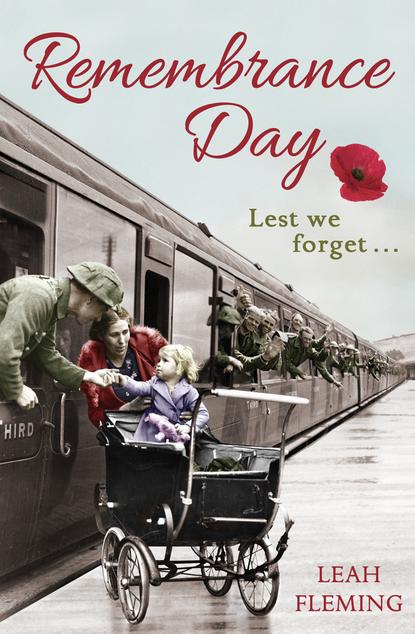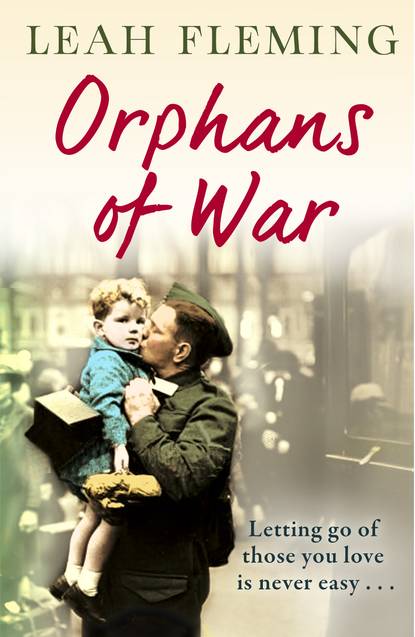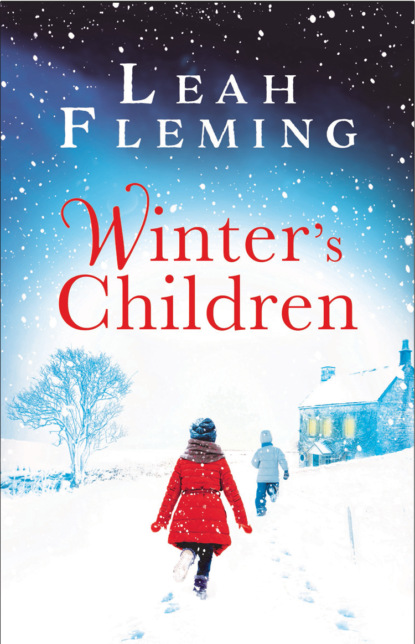
Полная версия
The Girl From World’s End

LEAH FLEMING
The Girl From World’s End

Copyright
This novel is entirely a work of fiction. The names, characters and incidents portrayed in it are the work of the author’s imagination. Any resemblance to actual persons, living or dead, events or localities is entirely coincidental.
AVON
A division of HarperCollinsPublishers 1 London Bridge Street, London SE1 9GF
www.harpercollins.co.uk
First published in Great Britain by HarperCollinsPublishers 2007
Copyright © Leah Fleming 2007
Leah Fleming asserts the moral right to be identified as the author of this work
A catalogue record for this book is available from the British Library
All rights reserved under International and Pan-American Copyright Conventions. By payment of the required fees, you have been granted the non-exclusive, non-transferable right to access and read the text of this ebook on-screen. No part of this text may be reproduced, transmitted, down-loaded, decompiled, reverse engineered, or stored in or introduced into any information storage and retrieval system, in any form or by any means, whether electronic or mechanical, now known or hereinafter invented, without the express written permission of HarperCollins ebooks
HarperCollinsPublishers has made every reasonable effort to ensure that any picture content and written content in this ebook has been included or removed in accordance with the contractual and technological constraints in operation at the time of publication
Source ISBN: 9781847560063
Ebook Edition © 2009 ISBN: 9780007334957
Version: 2018-06-19
Dedication
In memory of Kathleen, who loved these hills.
Epigraph
…grief has no wings. She is the unwelcome lodger that squats on the hearthstone between us and the fire and will not be moved…
Arthur Quiller-Couch
Armistice Day Sermon, November 1927
Contents
Title Page
Copyright
Dedication
Epigraph
Part One A Change of Sky
Chapter 1
Chapter 2
Chapter 3
Chapter 4
Chapter 5
Part Two Darkening Skies
Chapter 6
Chapter 7
Chapter 8
Chapter 9
Chapter 10
Chapter 11
Chapter 12
Chapter 13
Chapter 14
Chapter 15
Chapter 16
Chapter 17
Part Three The Snow House
Chapter 18
Chapter 19
Chapter 20
Author’s Notes
About the Author
About the Publisher
1
West Riding of Yorkshire, 1926
A girl of about eight sat swinging her legs to and fro to keep them from going numb, watching the sky growing dark above. The weak December sun dipped behind the high moor and soon the cobbled streets would be crusted with frost. When was Father going to come out of the Green Man and take her home? The church clock had struck half-past four. Soon the mill hooter would buzz across the rooftops and the clatter of clogs would deafen the streets.
It had been a grand afternoon: one of the good days when Paddy Gilchrist woke up by himself, whistling and promising her a ride on a tram to Bradford to look in the shop windows and hear the Christmas brass bands. They had got as far as the park, where he’d pushed her on the swings and slides, but then they’d made a detour through the back streets of Scarperton.
‘I’ll not be a minute, Mirren. Time for my medicine–just a wee nip to keep me warm,’ he laughed, his dark eyes pleading as he saw the little blue ribbon on her coat lapel and the wince of disapproval on her face.
She was proud of that badge and the signed certificate from the Band of Hope that said not a drop of liquor would ever pass the lips of Miriam Ellen Gilchrist.
‘Don’t be long,’ she pleaded, trying not to pout as her lips trembled. ‘You promised me a ride up to town.’
‘Aye, I know, lassie, but you don’t begrudge yer dad a little comfort now, do you? You sit tight and I’ll buy you some sweeties when I’ve had my snifter.’
She had sat on this bench so many times, dreading that the father who went in standing would be the one who’d come out on all fours. The Green Man was that sort of pub.
Paddy and Mirren didn’t live alone. There was a master in their rooms: one who ruled over them night and day, whose presence lurked like a ghost in the corner of the compartments of the disused railway carriage that was now their home. He was a magician, full of piss and wind and wild schemes, who could turn her dad into John Barleycorn, the drunken sot who needed a guiding hand to round the corners on his way home, knocking folk off the pavement as he sang out of tune at the top of his voice. Sometimes she opened the latch and he fell through the door, stiff like a board.
John Barleycorn had stale breath and leaking pants. He stole her father’s hard-earned wage and the food from their table, shaming her before school pals playing in the street, who would look up and snigger as she and her demon-possessed father wound their way down the ginnels from the pub, Mirren staggering under the weight of him. She worshipped her father–he was tall, handsome and strong–but she hated John Barleycorn, the drinker who was so weak and silly.
Demon Drink was not like the pantomime devil with horns and a forked tale, all red and black, shouting from a stage, or the wily tempter from the pages of her Sunday school prize book, with forked tongue and goatee beard. He came and went for no reason.
Sometimes he disappeared for weeks and gave her back the father she loved: the Paddy Gilchrist who had wooed and won young Ellie Yewell away from her farming family in the big Yorkshire Dales farmhouse, the railway navvy with his squeeze-box and fancy dancing and Scottish charm, who promised her the moon, sun and stars if she would be his bride. Then he went off to war, leaving his new bride with a bairn, Mirren’s angel brother, Grantley, and with no family to support them until he returned wounded right badly in the leg.
If only Mother and little Grant hadn’t died in the terrible sickness that came when she was a baby, leaving her motherless. How she wished they were all together, snug by their fireside of an evening, not freezing to death outside a public house.
Now the lamps were lit and Mirren was fed up of waiting. He’d forgotten she was there again and at the mercy of rough lads, making fun of her for being ‘Jill all alone’. Soon Woodbine Winnie would be touting for business and taking men in mufflers down the alleyway to lift up her skirts–to do quite what Mirren wasn’t sure, but it was something sinful.
At last Mirren recognised one of the men coming out of the pub as Mr Ackroyd, who lived in one of the far carriages that made up their row of houses in Chapelside Cuttings; old rolling stock being the only homes left for returning heroes from the war. Some wags laughingly called them ‘the Rabbit Hutches’, but Dad shrugged off the gibe and so did she.
Living in a neat line of compartments with steps up to their railway carriage was better than living back to back, up a steep hill with no garden to play in. She could sit for hours watching the engines shunting up and down the line, engine drivers waving and hooting. She knew the names of all the great iron boilers puffing and snorting out of the station on their way to Scotland and London; Duchess of Hamilton was her favourite.
Dad was a ganger on the line repairing the track. When he was in work there was always plenty of coal for the stove and treats. When there were layoffs they still had vegetables from the allotment and eggs from the chicken coop, but money was always a worry. Granny Simms, who lived next door with her son and his one leg, cooked for them and took in the washing in return for coal and treats, baccy and beer for Big Brian, who hobbled about the town on crutches, begging.
In Mirren’s life Granny Simms was a guiding light like the moon peeping through clouds. A neighbour who was mother, friend and comforter, she would know what to do. On nights like this Mirren could always knock on the window and Granny would open up, wrapped against the cold in the faded shawl she wore summer and winter, the long printed pinny with rubbed-out patches. Her face was leathery and lined with soot, hair scraped back in a knot, and she wore iron clogs, which rattled on the wooden carriage floor, and rolled-up stockings. She would take the little girl in and shove a fat rascal bun in her hand, spicy and full of currants.
It was Granny who taught her to knit, to peg a rug and bake bread, railway slice and dumplings. She saw that she got a proper schooling at St Mary’s and was turned out neat to all Sunday school treats going in the town.
‘He can’t help himself, Mirren,’ Granny Simms would sigh, showing empty gums with two yellow cracked front teeth. ‘Drink is a terrible thing. There’s many a red nose makes a ragged back in this town. It’s a pity the Paddy Gilchrist what came back from France was not the young lad who went to war, nor the man yer mam wed. A wild-eyed stranger he returned, not able to keep down a job, but she got him straight again. But when the Spanish flu came to visit us, it went through the town like a dose of Epsom salts. Yer dad just couldn’t get his head round that carry-on. He did his best with you, but men are useless when it comes to babbies. It’s a terrible temptation to drown yer sorrows, lass.’
These words made Mirren sad, for she knew her love would never be enough to mend her father’s heart. What he needed was the Word of God in his life, like the pastor in Sunday school preached, but Dad just laughed at her pleas for him to go to church.
‘Where was God when we needed him in the Battle of Arras? Where was he when the Angel of Death knocked at our front door? Ask your preacher man that!’ he would scoff. She had learned not to talk to him in drink but to hide in the little bench bed, under the quilt and blankets, pretending she couldn’t hear his sobs and rantings, praying that he would be in time to go to his work in the morning. Without work there was no rent money and no rent money would lead to the workhouse and pull them apart.
Then, without explanation, the sun would rise in the morning, bright and dazzling, full of promise when her real dad rose, bleary-eyed but ready for work, unaided, bringing home gobstoppers and fish and chips. She would dress quickly and take his hand before the clouds came back.
On such days Mirren could go to school and learn her tables and not worry about him being sent home. She liked to bury her head in a reading book and pretend she was the Little Princess in the attic or one of the Railway Children. On such days Dad would swing her round to ‘Charlie Is my Darling’ and call her his ‘own wee darling’, telling her she was pretty like her mother and what a lucky chap he was to have such a beautiful, clever daughter. When he held her hand and whistled to himself, she felt so safe until they stopped by the pub door and her heart sank with fear.
Now, tonight, was going to be another of the bad nights.
‘Is my dad still inside?’ she asked the old neighbour, Mr Ackroyd, as he passed.
‘Aye, lass, stuck to the bench a while yet. There’s some as never knows when they’ve had enough. Better get off home now. It’s no night to be out in the cold. Happen you’d better come along with me.’
‘Thank you, but I said I’d wait,’ she smiled, torn between wanting the warmth of Granny Simms’s iron stove and the need to see her dad home safely. Why should she wait when he didn’t care? Why should she believe any of his broken promises? He deserved to slip on the ice and crack his head but then he wouldn’t get to work on time and would be laid off and soon it would be Christmas and she had seen a little doll in the window of Bell’s Emporium with a sticky-out skirt and real hair.
But what was the point? He’d already spent his wages supping with his cronies. It was always the same palaver: he’d be ashamed and crawl home to sleep off the drink when she wasn’t looking, and then pretend none of this had happened.
Why should she wait a minute longer when there was someone at hand to guide her through the dark streets?
‘Wait, Mr Ackroyd, I’ll come with you…’
She spent the night at Granny Simms’s, sleeping in the chair. When it was morning, and there was no sign of Dad’s return, Mirren thought he would be lying snug in one of the refuge huts on the side of the railway track, hiding until he was sober enough to face her sullen anger. So she went to school with a heavy heart and thought no more about it.
She ran home at dinner break, hoping there would be smoke coming out of the carriage, but there were strangers waiting on the doorstep with Granny Simms, who nodded gravely as she saw her. There was a funny look in her eyes as Mirren approached more slowly.
She recognised Constable Fletcher, who was kind. He took off his helmet as he spoke.
‘You’ll have to be brave, lass. There’s been a terrible accident. Yer dad got knocked over on the track.’
Mirren shook her head, not wanting to hear what was coming next, wanting to run, but her legs had turned to jelly so she shoved her hands over her ears. It was Granny who put her arms around her shoulders and held her tight.
‘He wouldn’t’ve known a thing, love. He fell asleep on the line. He must have taken a short cut and slipped.’ Her eyes were full of tears.
Mirren couldn’t believe what she was saying. ‘Dad’d never cross the line at night. He said I must never do that. Where did it happen? You’ve got it all wrong. The track’s miles from the Green Man.’
‘I’m sorry, lass, but he must have been taking a short cut down the line in the early hours. He was hit on the down line–the night sleeper from Glasgow and him Scotch-born and all…Let yer granny make you a cup of tea,’ said the constable.
‘She’s not my granny,’ Mirren screamed in fury. ‘My real granny lives up the dale on a farm.’ At Christmas there was usually a parcel of clothes from Grandma, which never fitted, and a printed card from the Yewells of Cragside Farm. The rest of the year there was nothing.
‘I want to see my dad.’
‘That’ll not be possible,’ whispered the constable. ‘There has to be an investigation.’
‘I have to go and see if it’s him. It might not be him,’ Mirren said, not listening. This was all some strange nightmare she was living in and soon she would wake up. How could her dad be gone and have left her all alone?
‘Come on, Mirren, you’ve had a shock,’ Granny Simms whispered, ignoring the earlier betrayal. ‘She’ll stay with me until such times—’
‘But it’s all my fault,’ Mirren cried out. ‘I should’ve waited and brought him home.’
‘Now how do you make that out, young lady?’ said the policeman, kneeling down so close up she could see the hairs sprouting out of his nose.
‘I should have stayed on. He told me to stay outside on the bench, but I was cold and came home. He needed me and I wasn’t there. It’s all my fault.’ The hot tears began to roll down her cheeks. ‘I want my dad. I have to tell him I’m sorry.’
‘Now none of that, child,’ said one of the strangers, a man wearing a clerical collar. ‘Mr Gilchrist was a grown man and should’ve known better than to leave a child alone in the dark outside a pub,’ he tutted in her defence, but his words gave no comfort.
‘I’m afraid there’s many as does round here,’ answered the constable. ‘The child was right to go home. In his befuddled state, Paddy wouldn’t know what time of day or night it was. Don’t fret yerself, lass. It were an accident and a cruel one at that, just before Christmas.’
‘That remains for the coroner to decide,’ the parson replied. ‘The railway line is always a temptation, an easy way out of life’s troubles.’
‘Not in front of the kiddy, sir,’ snapped the constable. ‘She’s got enough to bear as it is, without putting that burden on her.’
But the words were spoken and a seed of doubt sown in turbulent soil. Mirren had sensed early that a force greater than her childish adoration always drew her father towards danger. He’d once lived in a world of soldiers. When he sat in the Green Man there were old pals from the war who supped and sang that ‘It’s a Long Way to Tipperary’ song that made him cry. Once she had rooted in his tin box of papers and found a likeness of him, standing so straight in his uniform, his dark hair plastered down and his moustache waxed. He looked so strong and handsome, but when he caught her staring down at it he almost slammed the lid on her fingers.
‘Put that away. There’s nothing in there for you!’
‘Is that you?’ she’d asked, looking at his kilt.
He’d stared down at the young man and shook his head. ‘Never seen him afore.’ His voice was cracked and his breath smelled of stout, his skin was grey, his shoulders stooped as he fought the demons she was too feeble to conquer. She never opened the tin box again because it was where he kept his wounds and pain, out of sight of a child’s prying eyes.
‘It is good to see this child Miriam has signed the pledge.’ The parson pointed to the badge on her lapel. ‘A weakness for strong drink is bred in the bone. Do you belong to the Band of Hope?’ He was changing the subject, trying to make polite conversation.
‘Yes, she does,’ Granny Simms interrupted. ‘She’s a regular at their banner parades and treat in the summer. She wears that blue ribbon all the time.’
‘Good. That’s a start, young lady, and next we must get the Welfare to sort out accommodation. She can’t stay here alone,’ he added.
‘She’ll bide with me tonight. This lass’s not budging from where she knows best,’ Granny said, holding her tight. Mirren’s eyelids were drooping, her mouth was dry, her head whirring as her legs buckled. ‘Look at the poor mite. She needs a mash of sweet tea. There’s friends enough round here to see to the poor bairn in her sorrow.’
They stumbled up the steps and into the fug and clutter of Granny Simms’s compartment, where Brian sat dosing with his dog on his lap. He didn’t know yet. He hadn’t heard the news.
For a second, life was as it always had been, bread and dripping on the table as if her world had not been turned upside down and she left alone.
If only she’d stayed with Dad, if only it was yesterday all over again. But the mill buzzer hooted at dinner time as normal. How could something terrible happen and the mill chimneys went on smoking just the same? She started to shake and couldn’t stop.
Granny shoved something bitter on her lips. ‘Sip it slowly, lass. It’ll calm you down,’ she coaxed, but Mirren spat it out.
‘It’s spirit. I know that smell. Don’t make me break my pledge.’
‘Bugger the pledge…It’s the only medicine for shock.’
‘What am I going to do?’ Mirren cried, feeling the hot whisky slipping down her throat. It tasted bitter. How could anyone pay good brass for such poison?
‘First things first. We’ll see yer dad buried good and proper and you kitted out to do him proud. Everything else can wait until then. Yer a good lass and sharp as a knife, but you’ve not gone far to find your sorrows. Happen something will turn up for you.’
‘I’ll have to go in the orphanage, won’t I?’ Everyone at school knew of the orphan kids, in their grey uniforms and cropped hair, who walked in lines around the town and had no parents to care for them.
‘Over my dead body! You deserve better and, as you said, I’m not yer real kin. It’s time them as are got to know what’s happened,’ Granny Simms smiled. ‘I’m no good with lettering but we’ll get someone to write and get them down here fast. It’s time they took up their responsibilities. Yer mam would have wanted that.’
‘But I’d rather stay here with you.’
Granny shook her head. ‘Be that as it may, there’ll be nothing but bad memories for you here. You deserve better. Happen it’s time you were changing yer sky!’
Adeline Yewell was too busy finishing off the Christmas pig to see the letter that George, the postman, delivered to the kitchen table at Cragside Farm. He would be wanting his forenoon drinkings and a bit of gossip with Carrie before he headed across the moor on foot to the next farm.
The farmer’s wife had trapped Myrtle, the brown pig, against the wall so she squatted on her fat rump. Then Adeline shoved a ball of oatmeal down the pig’s throat and gave her a sup of good buttermilk from the bucket to swallow. ‘That’s a girl, stuff thyself!’ She wanted some fat sweet flesh on this porker before she got seen to with an axe, strung up and bled off. At least her pigs died happy and belly stuffed. No place for oversentiment on a farm, she thought.
There was so much to see to before the big day and she didn’t want George holding up Carrie Sutcliffe from her chores. They were getting a bit sweet on each other, them two. She hoped that didn’t mean another live-in domestic giving notice. It was hard to get girls and lads to stay overlong up on the tops. They wanted to be in nearer the town.
Oh, what it was to be love-struck and silly! She could still recall the time when she’d made eyes at Joe Yewell at the Christmas dance, nearly forty years ago. It’s a good job she had collared and bagged him by the New Year stir-up in the village hall as he stomped across the wooden floor in his shirtsleeves, before the fiddle and the stamp of dancing feet became Satan’s snare.
Once he got ‘saved’ in Brother Handel Morton’s tent he hadn’t time for worldly gatherings, only preaching and chapel meetings. She’d caught him just on the turn, and her being Church not Chapel, it could have made things impossible.
The two didn’t mix in Windebank village, never had and never would, but love conquers all, so they say. The two of them went their separate ways each Sunday morning.
If only he could have made Ellen, their daughter, see sense when she fell for that Scotch navvy Gilchrist. They both felt it was a grave mistake, but the lass burned her bridges good and proper, and paid the price. They’d not even gone to her funeral for fear of catching the flu and passing it on up the dale.
That act of cowardice had never sat easy on her; cost many a sleepless night. To abandon their own daughter was not something either of them was proud of but Ellie’d made her bed and all that. It was her choice to go rushing up to Gretna Green making a fool of them all, having a bairn not six months afterwards. It was not easy to stomach having a thankless child.
Adeline’d done her bit for the kiddies but had never seen the last one nor wanted to, but her father being a Catholic and fond of drink was a worry. Sometimes she lay in bed and wondered if the girl had Ellie’s fair hair or the blue Yewell eyes renowned in the district for the distinctive dark ring round the iris, making them sparkle like sapphires. It was those blue globes that had drawn her to Joe’s side. When he gazed into her face she was lost.







